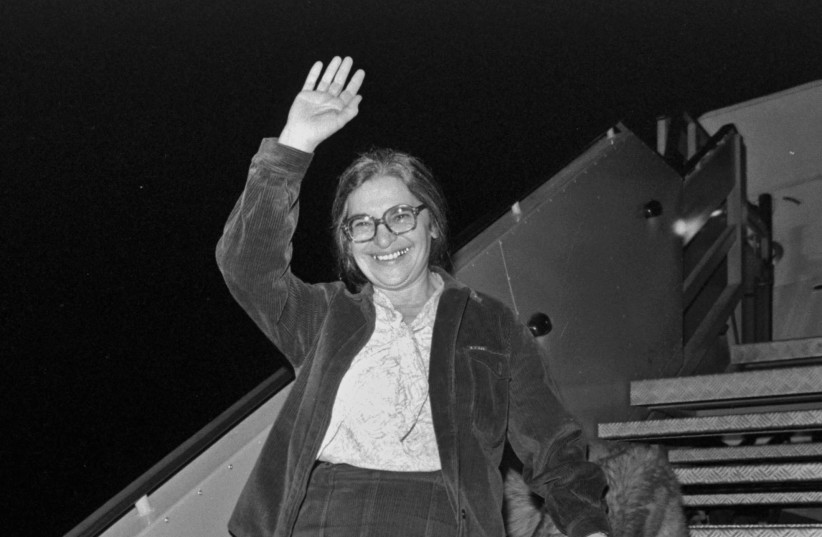“You can stop my body but you can’t stop my soul.”
Those are perhaps the most striking words out of director Tzedi Tzarfati’s latest musical production called Ida, portraying the life of famed refusenik Ida Nudel.
Currently being staged at the Habima Theater in Tel Aviv, the show began in September and plans to keep going for as long as people will turn out. The dramatic retelling of Nudel’s story has captivated audiences while teaching them about the hardship of making Aliya from the Soviet Union during the 1970s.
The story of Ida Nudel
Nudel, a single female accountant, took an interest in the Jewish cause at the age of 41 while living in Moscow. After being denied a visa to Israel, Nudel started to foster an underground network of Soviet Jews who wanted out. She organized protests and campaigns calling out the government for unfair and antisemitic treatment and even corresponded with Jewish prisoners who were sent to prison in Siberian for simply expressing an interest in immigrating to Israel. After being fired from her job and forced to stand trial for organizing illegal underground meetings, Nudel was sent to Siberia for four years. Though she was given the opportunity to be released early if she would make a public apology, Nudel refused and finished her sentence in –40°C weather.
Her tenacity could be felt all over the stage, as 43-year-old actress Riki Blich effortlessly reproduced Nudel’s tough-as-nails character during her years in the Soviet Union. Israeli legend Gila Almagor played an older Nudel, the version of her character as Israel viewed her after she finally made it to Israel.

The writer of the show, Shai Lahav, explained the choice to represent Nudel with two actresses on stage.
“It was important for us to divide, to show the contradiction between the glory of young Ida and the gray reality of her story in Israel after she came,” Lahav said.
“It was important for us to divide, to show the contradiction between the glory of young Ida and the gray reality of her story in Israel after she came.”
Shai Lahav
Nudel was a full-blown global icon during the years she fought to bring Jews to Israel. American actress Jane Fonda visited her in Siberia and when Nudel finally got approved for a visa, Israel celebrated her upon landing at Ben Gurion Airport with a welcome party. She even took a phone call from former American president Ronald Reagan congratulating her on her achievements. But soon after settling into Israel, Nudel was not able to maintain her star power. Lahav suggested that the same characteristics that helped Nudel succeed in the Soviet Union led to her demise in Israel.
“She was stubborn and always said what she thought. She didn’t want to be a part of the herd. It’s a good characteristic for a freedom fighter but not for a regular citizen in a democratic country.”
LAHAV ALSO commented on a theme that this play brings to light, which is the importance of remembering the past and celebrating the heroes who have paved the way for the next generation.
“Israel is always looking at the future and doesn’t give enough honor to the people who built the past. Ida Nudel is a good example. But not the only one. We tend not to remember our heroes.”
For some members of the cast, the show may as well have been a big therapy session. In an interview, Blich (the character of young Ida) spoke of her own trauma dealing with an immigrant family from the USSR. She said her parents experienced similar difficulties when trying to escape the USSR in the ‘70s. Her uncle spent time behind bars for being a Jew of Zion and Blich admitted her family history is something she has tried to erase in her rush to prove herself a proper Israeli. Blich’s first language is Russian.
“I told my bosses that I am willing to do anything just so every student in this country will see this play. I don’t think Israel can be totally proud of the way she treated these Jews from the Soviet Union and the way they treat their contribution to Israeli society,” Blich said. “If they let me, I’ll play this role for the next 10 years.”
For new immigrant and Ida cast member Nicole Raviv, this show was a full-blown Israeli debut. This singer-actress played a number of supporting roles during the show and reflected on how learning the story of Nudel made her feel grateful to have come to Israel by choice. Raviv was raised between Montreal and New York City. Having arrived in Israel as a new immigrant just over a year ago, she had to spend hours improving her Israeli accent to blend in.
“It’s the first professional acting role I landed in Israel and I believe it isn’t coincidental. It’s a way of paying homage, where passion meets history because I need to be a part of telling this story of our people and not just any story,” Raviv said. “I only hope to keep growing from here.”
The show’s tragic conclusion shows Nudel in Israel, struggling with the government on yet another venture: this time, a fund to help mothers in need. The show concludes with information about Nudel’s death in September 2021. Only 40 people came to her funeral, a very small number for someone who, for so many years, was a world icon. Not a single Israeli official was present at the funeral. While the show certainly tackles the issues of democracy, immigration and legacy, it also touches on family dynamics and the importance of relationships.
The play runs at Habima theater in Tel Aviv indefinitely.
